
Market Guide: Tilt Rotators
Peter Anderson reviews the latest developments in tilt-rotators with an introduction from Graham Black.
Originating in Sweden, tilt-rotating hitches were introduced nearly 40 years ago. Over that time, they have become an almost mandatory requirement for the majority of excavators and big backhoes working throughout Scandinavia.
The UK also has a long history of tilt-rotators, which started the best part of two decades ago with pioneers such like Pat Bulcock. The UK is now a maturing market for tilt-rotators, with several new competitors in the market.
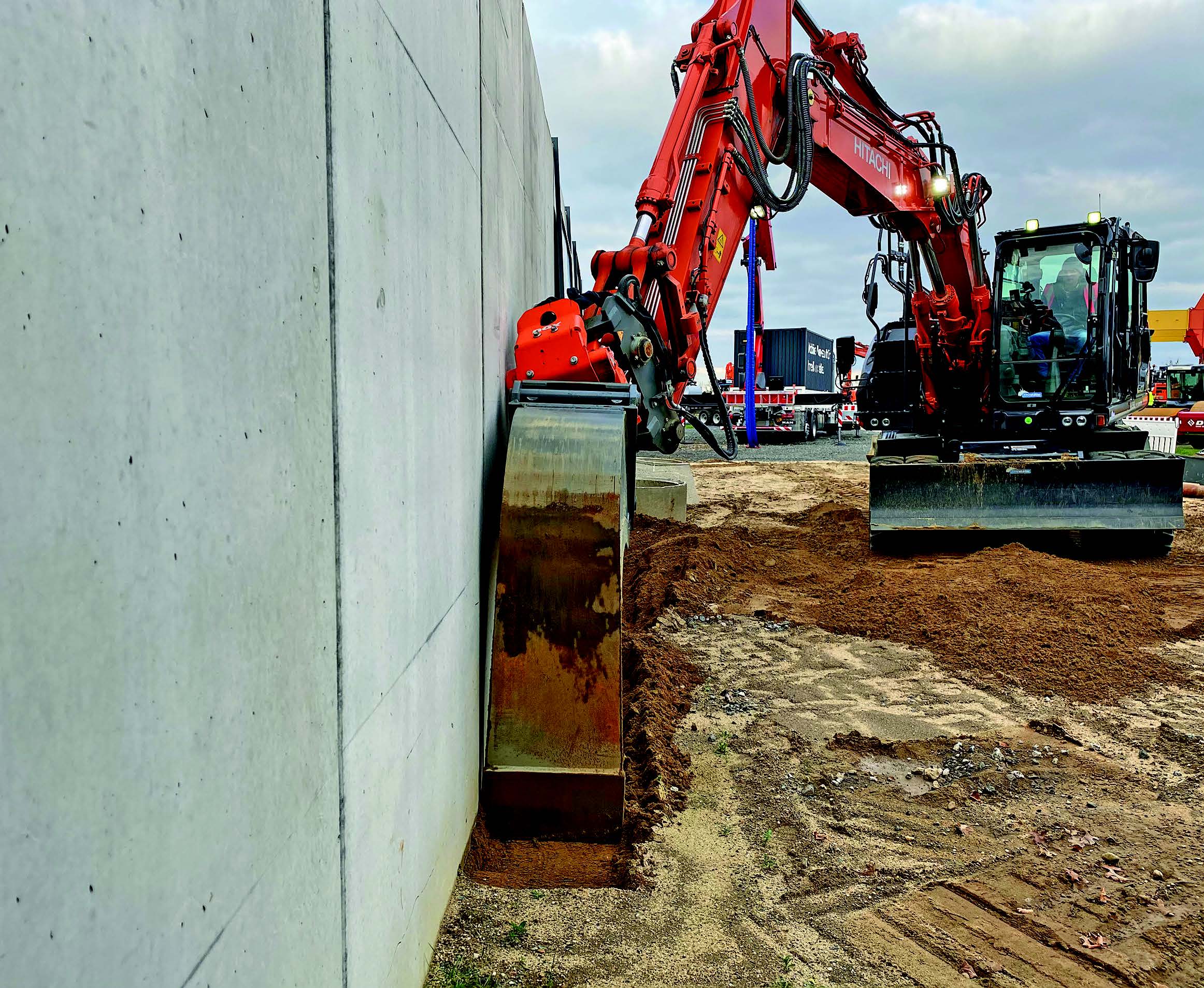
The more widespread use of tiltrotators is driving subtle but important changes in the industry, including the growing uptake of attachments with universal S-type hitch patterns. They have also stimulated a growing interest in tilting hitches, or the somewhat under-valued rotating hitch. More importantly, there is a growing focus on the use of specialist, hydraulically powered attachments. In turn, this has led to a demand for hitches that also automatically connect and disconnect the hydraulic services to the attachment.
Relatively straightforward tilt-rotator set-ups are successfully used with the standard proportional controls on the joysticks of top-end modern excavators. However, to get the most out what is a substantial investment, replacement tilt-rotator specific, multi-function physical hand controls are usually specified.
There are both short- and long-term benefits of using a hitch that can tilt attachments by 45 degrees to each side, while also rotating through 360 degrees. All are associated with the operator being able to perform a greater range of tasks, over a larger working area, from a single stationaryposition.
Eliminating the need continuously to relocate the machine improves the operator’s productivity. As most tilt-rotators feature an integrated grapple, this handy bonus attachment dramatically reduces the need for ground workers to perform manual handling duties, further increasing operator productivity.
By investing in the latest tilt-rotator technology and with a reduction in unproductive tracking, it is not unreasonable to assume a fuel saving of at least a litre an hour over the same machine and operator without a tilt-rotator. This soon mounts up over the lifetime of an excavator on the fleet, as does less wear and tear on its expensive to replace track components.
Engcon
The latest news from Engcon is the arrival of the EC319 tilt-rotator from the Swedish firm’s all-new third generation of smart hitches, which just keep getting smarter. This latest example features a load-sensing device, which will reduce the demands on the hydraulic system of the host excavator.
There is also an artificial intelligence (AI) driven sub-system to optimise the configuration of the tilt-rotator to the hydraulic characteristics of its host. This has the potential to result in significant fuel savings.
In addition to a range of sensors within the tilt-rotator, some of which contribute to a safe attachment change sub-system, Engcon has also introduced the DC3 control system. It features real-time remote support, while the operator’s smart phone is also used to customise and store machine settings.
Masterhitch Europe
A new entrant to the market is Strood-based Masterhitch Europe, which is part of the HE Group. It includes one of the UK’s most extensive plant hire fleets, which also features a comprehensive range of attachments.
Designed for excavators with operating weights between eight and 15 tonnes, RotoWrist MH tilt-rotators are primarily designed to dramatically improve the machine’s ability to allow an operator to perform grading and landscaping works more efficiently.
In addition to 360 degrees of rotation, the unique cylinder-less design offers an incredible tilting range. The MH08 model can tilt up to 90 degrees each way, while the MH15 unit offers a very respectable 65 degrees of each-way tilt.
Versafix
Situated near Newry in Northern Ireland, Versaffix was founded by the well-known local industry figure Gerard Doherty. The firm is located in a strategic hub of innovation, which is leading the industry’s transformation.
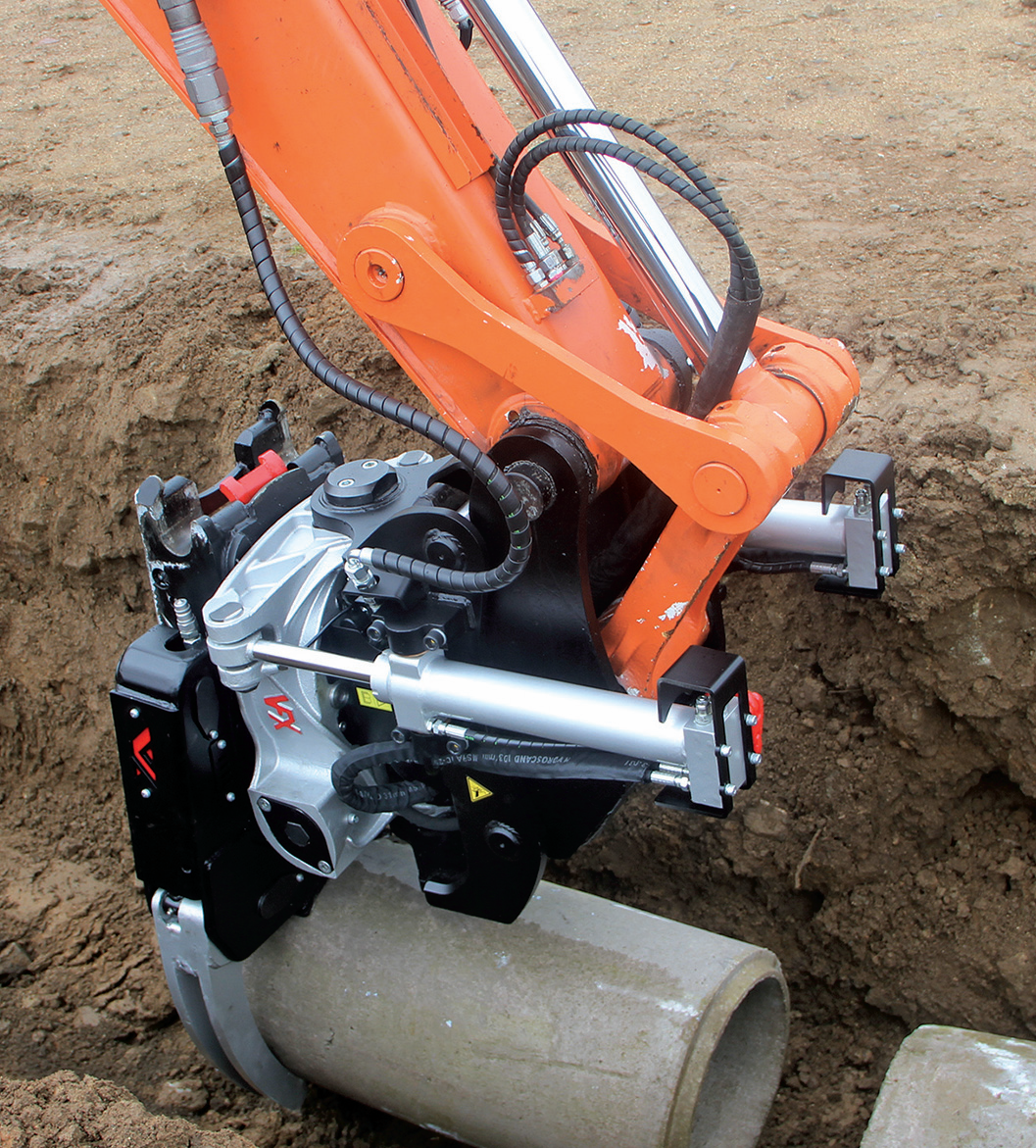
With a construction background from Doherty Developments, and drawing upon the rich engineering expertise of the Re-Gen Group, Gerard’s new firm is producing a range of home-grown tilt-rotators, which are suitable for excavators from three to 18 tonnes.
Oilquick/Engcon mix
Swedish-based hydraulic service coupler specialist OilQuick provides the fi ve-model range of OQTR-E tilt-rotators that are suitable for excavators from six to 33 tonnes. They are based on an Engcon body, with the OilQuick coupler system top and bottom.
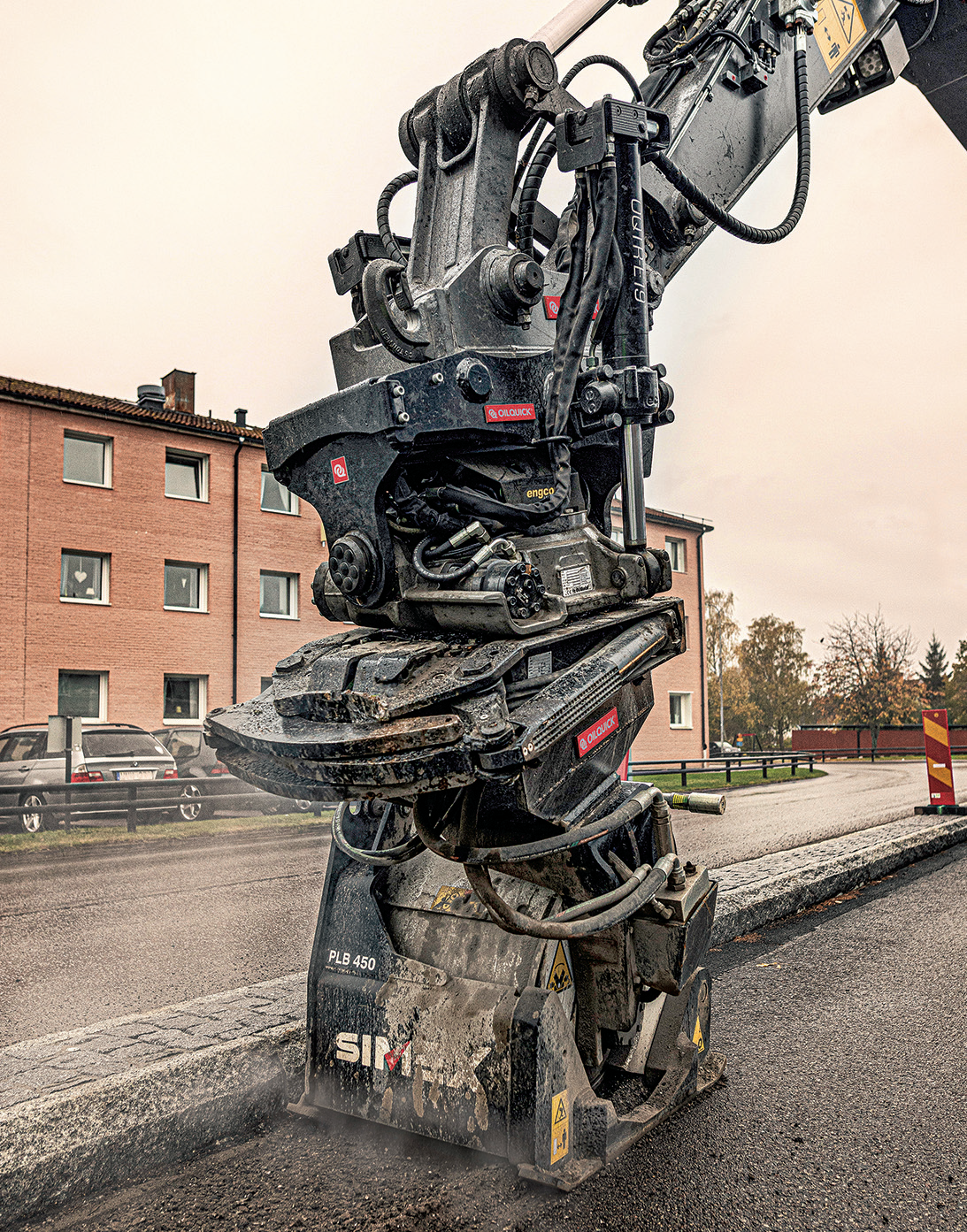
For safe and secure attachment changeovers, OilQuick offers the Lock Support sub-system. The options list includes a high-flow swivel for running high-fl ow attachments, together with a grapple module for effi cient picking and handling, alongside the use of their MIG2 joysticks for improved ergonomics and functionality.
OilQuick quantify the advantages of a tilt-rotator in terms of increased production rates. They reckon that a 15-tonne excavator with one of their tilt-rotators will load up to 55 tonnes more an hour, reducing the cost per tonne moved.
Kinshofer/Nox
The range of Kinshofer NOX tilt-rotators consists of six models, suitable for mounting to excavators with operating weights from two to 15 tonnes. Rather than hydraulic cylinders to operate the tilt function, this design features an elliptical piston actuator. It is said to generate high power and consistent performance at all angles, while providing a compact form for reaching deep down into trenches.
They come ready to work with a 2D or 3D machine guidance system. Their extensive options list includes an attachment recognition sub-system, together with an electric feed-through. There is also a high-flow swivel option, able to withstand up to 4320psi/300bar of hydraulic pressure.
Kinshofer reports success lower down its range, such as the TR05 model for 2.5- to 4.5-tonne mini-excavators. A new smaller model, featuring a different tilting system is due for launch in the coming months. The TR025 will be aimed at small minis, in the 1.0- to 2.5-tonne range.
Marttiini
Not all Scandinavian tilt-rotators are made in Sweden. Based in the north of Finland, long established attachment manufacturer Marttiini Metal produces a five-model range of MRT tilt-rotators suitable for excavators from nine to 45 tonnes. High-flow hydraulics are now included with over 100lit/min of oil for hydraulic attachments.
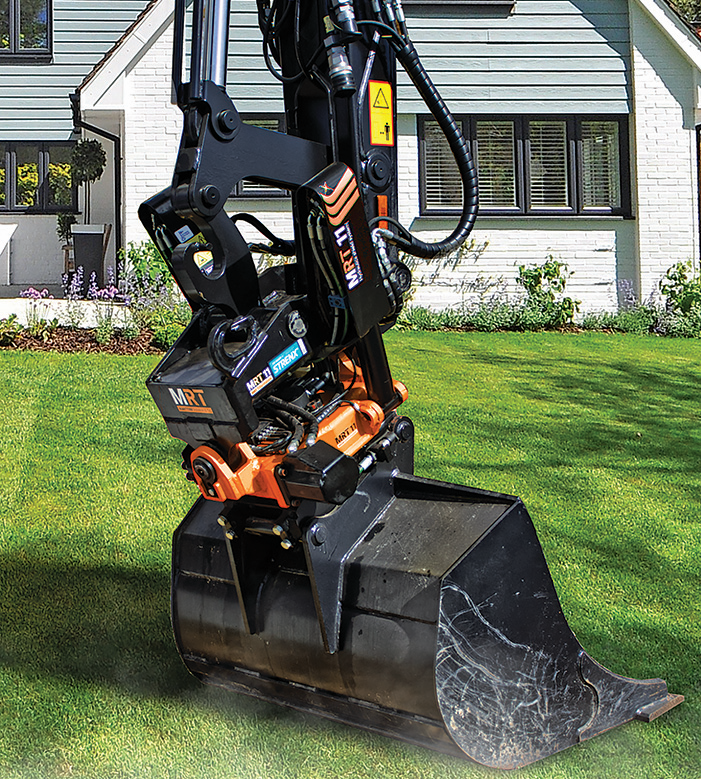
The MRT’s proportional control system includes L8 joysticks and an in-cab touchscreen. The options list includes a factory installed
central lubrication system, which the firm says is genuinely designed for harsh Nordic winter conditions. Other options include a four-hose expansion kit and sensors for connection to a machine guidance system. The quick coupler system supplied comes complete with auto electrical
and hydraulic connections.
Mazio Attachments
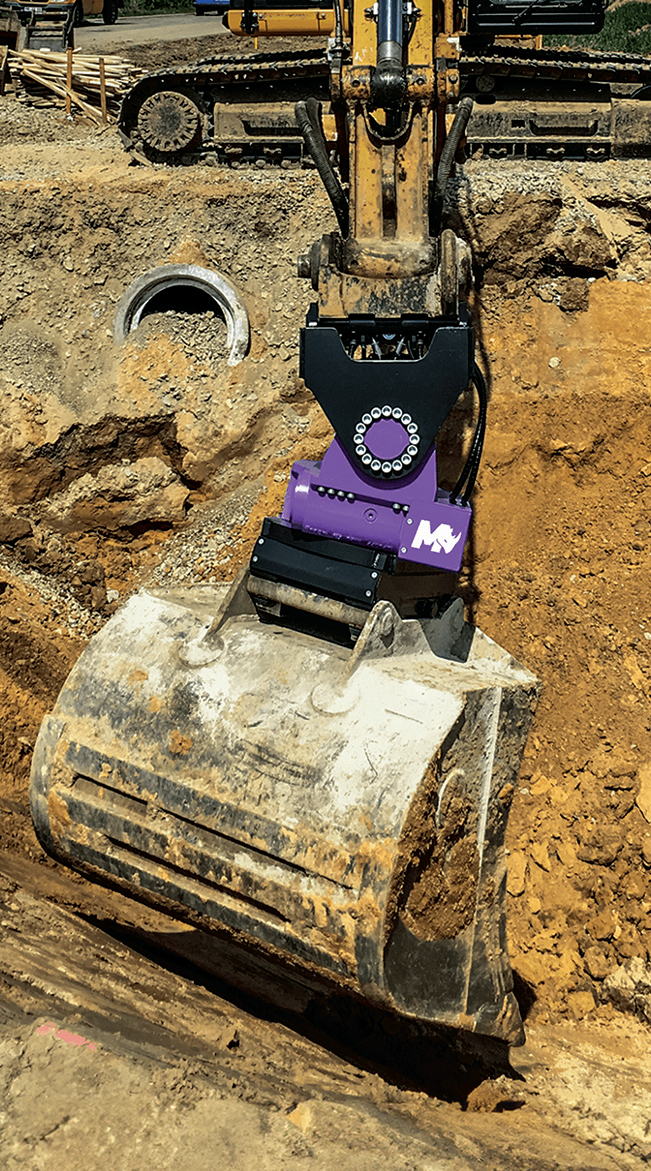
Italian manufacturer Mazio Attachments launched its new tilt-rotator at the ConExpo 2023 trade show. In addition to 360 degrees of rotation,
they have the ability to tilt side-to-side by up to 55 degrees. The low-profile design includes a quick-hitch that, apparently, includes the automatic coupling of hydraulic services. It is a maintenance free design, with no grease points and no hydraulic cylinders.
Steelwrist
Swedish tilt-rotator manufacturer Steelwrist has also launched its third generation of hitches. The centrepiece of the new range is the XTR20 tilt-rotator, which is designed for excavators weighing from 16 to 20 tonnes.
It is built from cast steel components including the upper coupler, gearbox as well as the bottom quick coupler. It features off-centre tilt cylinder brackets, so consequently the tilt cylinders have become shorter, optimising the geometry. This has contributed to the tilt-rotator’s compact form, which includes a reduction in build height.
Other features include a new LockSense attachment safety system, together with OptiLube, an onboard greasing system.
Rototilt
Eight models make up the Rototilt range of tilt-rotators, which are suitable for excavators with operating weights between 1.5 and 43 tonnes. They are supplied with the firm’s RC joysticks and an 11cm touch-screen.
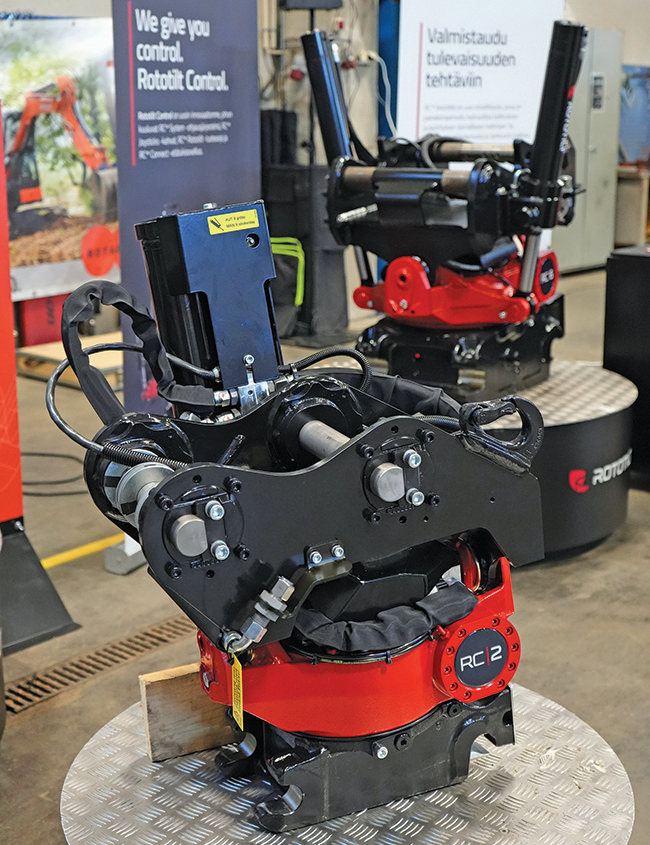
The latest and smallest models are the R1 and RC2, which cater for miniexcavators weighing from 1.5t to 3.5t and from 3t to 6.5t, respectively.
The RC range features pressurecompensated hydraulics for greater energy efficiency and control, and are said to be easier to use than the previous R-series. They use Rototilt’s QuickChange couplers for the fully automatic changeover of hydraulic powered attachments. They come as standard with the SecureLock attachment system for increased safety, while their RC Connect app delivers remote assistance. The options list includes full connectivity with a 3D GPS machine guidance system.
JCB
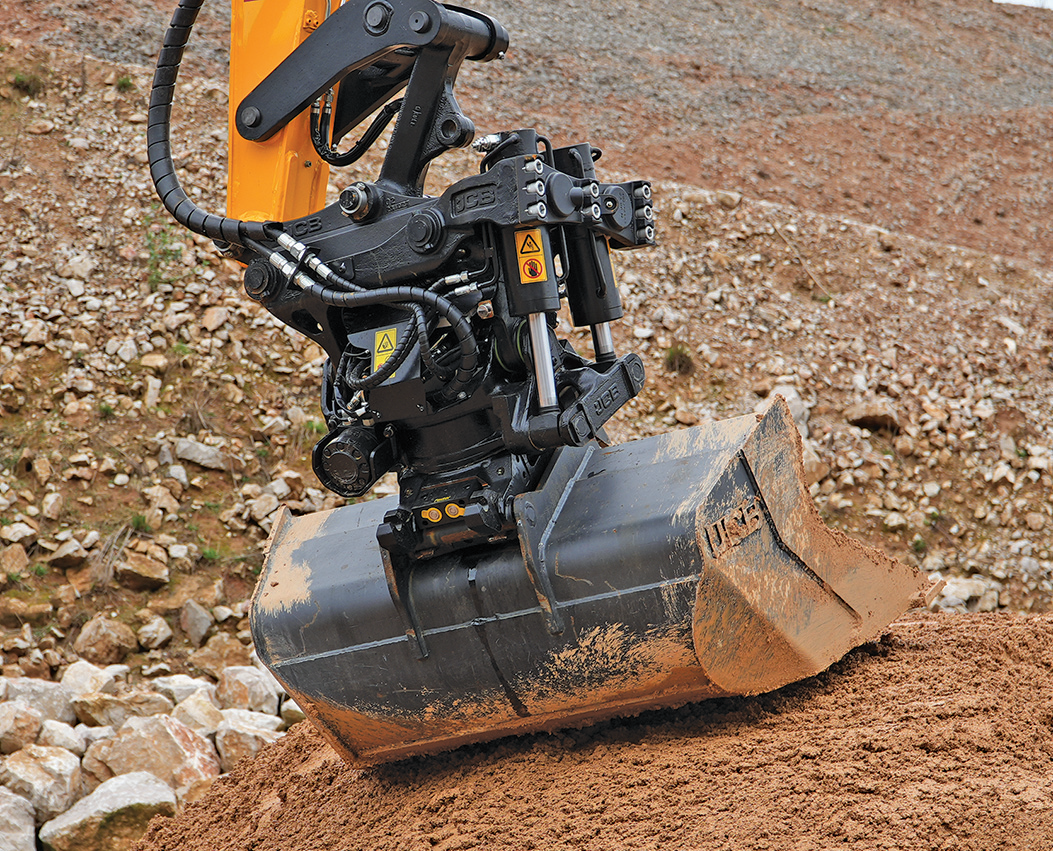
The latest design of tilt-rotator on the market is from JCB, with a model specifically designed for their Hydradig wheeled excavator.
This article featured in the August 2024 issue of Earthmovers magazine.
Subscribe to Earthmovers!
Subscribe to the industry-leading construction machinery publication here.
- Earthmovers is packed with all the latest construction machinery news and information to keep you up-to-date with industry developments.
- Impartial in-depth reviews will ensure you buy the best whatever your budget
- First-hand experiences of genuine owners and operators
- On-site analysis of the latest products by industry experts
- Save on the newsstand price of 12/24 issues and receive your magazines direct to your address, usually before it’s in the shops!